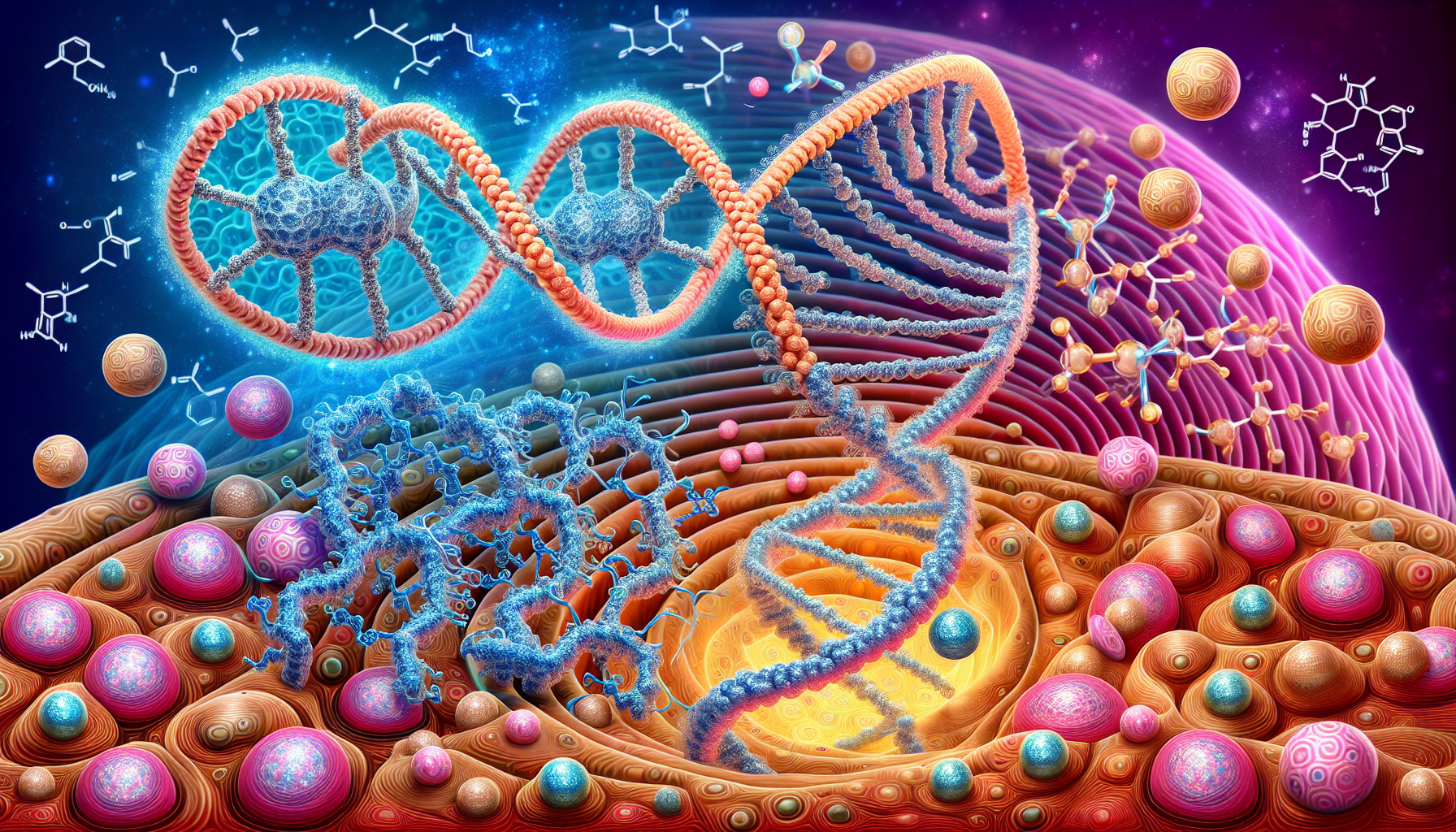Do Collagen Supplements Increase Estrogen Levels? Everything You Should Know Before Trying Them
Do collagen supplements increase estrogen levels? It’s a critical question for anyone considering adding collagen to their wellness routine.
While collagen is prized for its potential benefits for skin, joints, and bones, its impact on hormones like estrogen is less clear.
Emerging research is shedding light on the complex relationship between collagen and estrogen, with important implications for your health.
In this article, we’ll clarify what the science really says, arming you with the knowledge to make smart choices about collagen supplementation.
Keep reading to discover the essential facts about collagen and estrogen that you need to know now. What you learn may transform how you approach boosting collagen levels for your wellbeing.
 Let’s explore the essential roles of collagen and estrogen in maintaining our health.
Collagen, a key protein in our connective tissues, is vital for skin and bone health. It keeps our skin firm and resilient.
Estrogen, beyond its role in the reproductive system, helps boost collagen production.
Both components don’t maintain steady levels throughout life. They fluctuate over time, causing various issues for individuals regardless of gender.
Declining estrogen levels, particularly during menopause, lead to declining collagen production, which can affect skin health and overall vitality.
Grasping their significance provides foundational insight into how they interact with each other—and such knowledge is key to understanding their collective impact on human health.
Let’s explore the essential roles of collagen and estrogen in maintaining our health.
Collagen, a key protein in our connective tissues, is vital for skin and bone health. It keeps our skin firm and resilient.
Estrogen, beyond its role in the reproductive system, helps boost collagen production.
Both components don’t maintain steady levels throughout life. They fluctuate over time, causing various issues for individuals regardless of gender.
Declining estrogen levels, particularly during menopause, lead to declining collagen production, which can affect skin health and overall vitality.
Grasping their significance provides foundational insight into how they interact with each other—and such knowledge is key to understanding their collective impact on human health.
 The interaction between collagen and estrogen is crucial for understanding their relationship.
Estrogen attaches to receptors on skin fibroblasts, promoting collagen synthesis, which helps keep skin firm and resilient.
When estrogen levels are high, collagen production increases, maintaining youthful and taut skin. But as time goes by, this productivity wanes.
Thus, less collagen results in a thinner complexion and more visible aging signs. This becomes especially noticeable during menopause, when lower estrogen levels reduce collagen production.
The interaction between collagen and estrogen is crucial for understanding their relationship.
Estrogen attaches to receptors on skin fibroblasts, promoting collagen synthesis, which helps keep skin firm and resilient.
When estrogen levels are high, collagen production increases, maintaining youthful and taut skin. But as time goes by, this productivity wanes.
Thus, less collagen results in a thinner complexion and more visible aging signs. This becomes especially noticeable during menopause, when lower estrogen levels reduce collagen production.
 Estrogen’s significant influence on collagen is attributable to the small fibroblasts that increase their production of collagen when stimulated by estrogen.
This interesting interaction involves estrogen activating these fibroblasts and also affecting the equilibrium of enzymes responsible for degrading collagen.
The effects of this hormone are crucial in maintaining the skin’s robustness and pliability, making it remain firm and elastic.
Hormone replacement therapy offers postmenopausal women hope through its potential to rejuvenate skin collagen levels, including using topical estrogen treatments which can enhance skin elasticity.
Estrogen’s significant influence on collagen is attributable to the small fibroblasts that increase their production of collagen when stimulated by estrogen.
This interesting interaction involves estrogen activating these fibroblasts and also affecting the equilibrium of enzymes responsible for degrading collagen.
The effects of this hormone are crucial in maintaining the skin’s robustness and pliability, making it remain firm and elastic.
Hormone replacement therapy offers postmenopausal women hope through its potential to rejuvenate skin collagen levels, including using topical estrogen treatments which can enhance skin elasticity.

Key Takeaways
- Current research does not clearly show that collagen supplements increase estrogen levels, though they offer various health benefits for skin, bones, and joints.
- Collagen plays a critical role in maintaining skin elasticity and bone density, while estrogen helps regulate collagen production by activating fibroblasts.
- Estrogen levels naturally fluctuate throughout the menstrual cycle and decline significantly after menopause.
- When choosing a collagen supplement, look for high-quality, rigorously tested products like Clean Sourced Organic Collagens Powder that provide multiple collagen types from diverse sources.
- Consumers should be cautious when choosing collagen supplements, checking for potential allergens, consulting healthcare providers, and selecting reputable brands with third-party testing.
Understanding Collagen and Estrogen
 Let’s explore the essential roles of collagen and estrogen in maintaining our health.
Collagen, a key protein in our connective tissues, is vital for skin and bone health. It keeps our skin firm and resilient.
Estrogen, beyond its role in the reproductive system, helps boost collagen production.
Both components don’t maintain steady levels throughout life. They fluctuate over time, causing various issues for individuals regardless of gender.
Declining estrogen levels, particularly during menopause, lead to declining collagen production, which can affect skin health and overall vitality.
Grasping their significance provides foundational insight into how they interact with each other—and such knowledge is key to understanding their collective impact on human health.
Let’s explore the essential roles of collagen and estrogen in maintaining our health.
Collagen, a key protein in our connective tissues, is vital for skin and bone health. It keeps our skin firm and resilient.
Estrogen, beyond its role in the reproductive system, helps boost collagen production.
Both components don’t maintain steady levels throughout life. They fluctuate over time, causing various issues for individuals regardless of gender.
Declining estrogen levels, particularly during menopause, lead to declining collagen production, which can affect skin health and overall vitality.
Grasping their significance provides foundational insight into how they interact with each other—and such knowledge is key to understanding their collective impact on human health.
What is Collagen, exactly?
Collagen serves as the essential adhesive substance in our bodies, existing in various parts such as:- bones,
- muscles,
- skin,
- and tendons.
- enhancing bone density which provides a solid base for our physical structure,
- ensuring healthy joints, tendons, and ligaments,
- and contributing to the strength and flexibility of our hair, nails, and skin.
What is Estrogen, exactly?
Estrogen is often regarded as the essential hormone for females, deeply entwined with their reproductive processes and much more. It manifests in different variants like estrone, estradiol, and estriol. Each variant contributes significantly to a woman’s health. Aside from its role in reproduction, estrogen also plays critical roles by regulating anxiety levels, modulating moods, and influencing sleep patterns, and it is vital for the welfare of menopausal women due to its interaction with estrogen receptors. Estrogen is a vital hormone for women, playing a crucial role in their reproductive health and overall well-being. When balanced, it supports various bodily functions.The Relationship Between Collagen and Estrogen
 The interaction between collagen and estrogen is crucial for understanding their relationship.
Estrogen attaches to receptors on skin fibroblasts, promoting collagen synthesis, which helps keep skin firm and resilient.
When estrogen levels are high, collagen production increases, maintaining youthful and taut skin. But as time goes by, this productivity wanes.
Thus, less collagen results in a thinner complexion and more visible aging signs. This becomes especially noticeable during menopause, when lower estrogen levels reduce collagen production.
The interaction between collagen and estrogen is crucial for understanding their relationship.
Estrogen attaches to receptors on skin fibroblasts, promoting collagen synthesis, which helps keep skin firm and resilient.
When estrogen levels are high, collagen production increases, maintaining youthful and taut skin. But as time goes by, this productivity wanes.
Thus, less collagen results in a thinner complexion and more visible aging signs. This becomes especially noticeable during menopause, when lower estrogen levels reduce collagen production.
How Collagen and Estrogen Levels Change Over Time
Over time, our bodies experience inevitable changes. In women, these transitions are characterized by a drop in estrogen levels, especially during and after the approach to menopause. The decrease in this hormone closely affects the body’s ability to produce collagen, resulting in a significant 30% reduction of collagen content within the skin over five years post-menopause. This insidious process can commence as early as our mid-20s when we see a gradual decline in collagen synthesis. Consequently, we witness diminishing skin elasticity and potential bone fragility as age progresses. Treating estrogen-deficient skin is crucial to mitigate the effects of declining estrogen levels, as it helps stimulate collagen production and supports estrogen receptors in the skin to restore youthful, radiant skin.How Estrogen Affects Collagen Production
 Estrogen’s significant influence on collagen is attributable to the small fibroblasts that increase their production of collagen when stimulated by estrogen.
This interesting interaction involves estrogen activating these fibroblasts and also affecting the equilibrium of enzymes responsible for degrading collagen.
The effects of this hormone are crucial in maintaining the skin’s robustness and pliability, making it remain firm and elastic.
Hormone replacement therapy offers postmenopausal women hope through its potential to rejuvenate skin collagen levels, including using topical estrogen treatments which can enhance skin elasticity.
Estrogen’s significant influence on collagen is attributable to the small fibroblasts that increase their production of collagen when stimulated by estrogen.
This interesting interaction involves estrogen activating these fibroblasts and also affecting the equilibrium of enzymes responsible for degrading collagen.
The effects of this hormone are crucial in maintaining the skin’s robustness and pliability, making it remain firm and elastic.
Hormone replacement therapy offers postmenopausal women hope through its potential to rejuvenate skin collagen levels, including using topical estrogen treatments which can enhance skin elasticity.
Do Collagen Supplements Increase Estrogen Levels?
The pressing question is whether collagen supplements can increase estrogen levels. Current research hasn’t shown a clear link between collagen supplements and changes in hormone levels, including estrogen. More studies are needed to understand this relationship fully.Potential Mechanisms of Action
Is it possible that there exists an indirect method by which collagen supplements could aid in the health of skin related to estrogen? The hypothesis is intriguing, considering that collagen may serve as a defense against cortisol—a stress hormone known for its harmful impact on the skin. If collagen supplements can mitigate cortisol’s negative effects, they might inadvertently be supporting the role of estrogen within the skin without necessarily increasing estrogen levels. This understated but potentially meaningful effect calls for more research to fully understand its implications.Benefits of Collagen Supplements for Women
Exploring the realm of collagen supplements uncovers a wealth of benefits that may significantly impact women’s health. The enticement of attaining more supple skin and fortifying bone strength positions collagen supplementation as a possible universal remedy for various signs of aging. This form of supplementation might also bring comfort to those suffering from joint pain while potentially bolstering heart health. Delving deeper into how these supplements can improve well-being reveals that they could be particularly beneficial for most women, especially with advancing years.Supporting Skin Health and Elasticity
The touted benefits of collagen supplements in skin health include their capacity to:- Enhance skin health
- Strengthen skin elasticity
- Augment hydration levels
- Diminish the visibility of fine lines and wrinkles
Promoting Bone and Joint Health
The advantages of collagen are not limited to superficial enhancements in skin health. Collagen supplements may serve as a vital aid for women, especially those who have gone through menopause symptoms, by possibly boosting bone density and curbing the threat of osteoporosis, thereby acting as protectors of our bone integrity. It is important to consider the crucial role that joints play in facilitating motion and agility. Studies indicate that collagen supplements could provide relief from joint discomfort and inflexibility – offering significant benefits for individuals grappling with arthritis-related issues.Enhancing Muscle Mass and Weight Loss
Collagen plays a critical role in augmenting muscle mass for the physically active woman. It not only nurtures lean muscle development but also delivers energy to muscles during workouts, positioning collagen supplements as possibly overlooked yet vital contributors to an effective fitness plan. There’s also a compelling angle regarding collagen’s contribution to weight loss. This dual advantage of promoting both workout efficiency and dietary balance resonates with the aspirations of those striving toward a healthier and more harmonious way of living.Choosing the Best Collagen Supplement
When selecting a collagen supplement, quality is paramount. Look for products that offer multiple collagen types from diverse sources to provide a wide range of benefits. Clean Sourced Organic Collagens Powder stands out as a top choice, featuring five collagen types (I, II, III, V, and X) derived from four real food sources: beef, chicken, fish, and eggshell. This comprehensive blend is enhanced with vitamin C, B6, zinc, and silica for optimal bioavailability and absorption. Clean Sourced Organic Collagens Powder dissolves easily, has no odor or taste, and packs 8g of complete protein per serving with the addition of tryptophan. It’s also low in calories and free from carbs and sugar. Importantly, Clean Sourced Organic Collagens Powder undergoes rigorous third-party testing to ensure the absence of harmful substances like glyphosate, heavy metals, and pesticides. When investing in your health, opting for a high-quality, carefully formulated product like Clean Sourced Organic Collagens Powder can make all the difference in achieving your wellness goals.Risks and Considerations
Every benefit has its drawbacks, and collagen supplements are no exception. One must proceed with caution in this area since the supplement industry lacks regulation by the FDA. This lack of oversight necessitates that consumers diligently investigate products and seek advice from healthcare professionals before incorporating any supplement into their routine. Individuals who have allergies or specific dietary requirements should meticulously examine product labels. Certain collagen supplements might include allergenic ingredients or not align with vegetarian diets, thus it’s critical to be thorough when checking these details.Possible Side Effects
Discussing collagen supplements requires the acknowledgment of possible adverse reactions. Collagen is typically considered safe, but it can lead to digestive issues or allergic reactions in certain people. On very rare occasions, serious side effects such as anaphylaxis or liver irregularities have occurred. It is crucial to pay attention to how your body reacts when taking any dietary supplement, and consult with a healthcare professional should you notice any negative symptoms.Interaction with Other Supplements and Medications
Interactions specifically involving collagen and various drugs are not extensively reported. Some collagen supplements may contain extra components like biotin or herbal extracts that could potentially cause interactions. It’s critical to consult your healthcare provider about any supplement consumption you’re considering to confirm its safety and efficacy.Quality and Regulation of Collagen Supplements
Finally, the scrutiny of collagen supplement quality and oversight is crucial. Given that there’s no pre-market FDA regulation, consumers must take responsibility for choosing collagen products from trustworthy brands that adhere to safety and efficacy guidelines.The Bottom Line on Collagen, Estrogen, and Your Health
Collagen and estrogen play vital roles in maintaining the health and vitality of your skin, bones, and overall well-being. While current research doesn’t definitively show that collagen supplements directly increase estrogen levels, they still offer a range of potential benefits for women at all stages of life. By supporting skin elasticity, hydration, and firmness, as well as promoting bone and joint health, collagen supplements can be a valuable addition to your wellness routine. When choosing a supplement, prioritize quality and purity, opting for reputable brands like Clean Sourced Organic Collagens Powder that undergo rigorous third-party testing. As with any dietary supplement, it’s essential to consult your healthcare provider to ensure safety and effectiveness, especially if you have pre-existing health conditions, allergies, or are pregnant or nursing. Are you ready to experience the potential benefits of collagen for yourself? Visit our website to learn more about Clean Sourced Organic Collagens Powder and how it can support your journey to optimal health and radiance, inside and out.Frequently Asked Questions
Can collagen supplements directly increase estrogen levels in the body?
Currently, there is insufficient proof to substantiate the claim that taking collagen supplements results in a direct boost of estrogen levels within the body. A more definitive link between collagen supplementation and estrogen can only be determined through additional investigative studies.Is it safe for pregnant or breastfeeding women to take collagen supplements?
Yes, while collagen is typically considered safe for those who are pregnant or nursing, it’s essential to seek guidance from a healthcare professional before initiating any supplement regimen.How do collagen supplements benefit skin health?
Incorporating collagen supplements into your skincare regimen can enhance skin elasticity, boost hydration, and lessen the visibility of wrinkles by promoting not only collagen production but also other vital structural proteins.What should I look for when choosing a collagen supplement?
When selecting a collagen supplement, it’s advisable to opt for trusted brands that contain hydrolyzed collagen to enhance absorption and have minimal additional ingredients. Also, ensure the product has undergone third-party testing to verify its quality and purity to secure a dependable supplement.Organixx Clean Sourced Collagens blend contains five types of collagen from four sources. What’s more, it’s combined with targeted nutrients such as zinc, vitamin C, and vitamin B6 which specifically enhance the bioavailability and potency of collagen. Clean Sourced Collagens is formulated from the ground up to enhance and support your body’s natural ability to heal and rebuild itself from the INSIDE out.




Comments